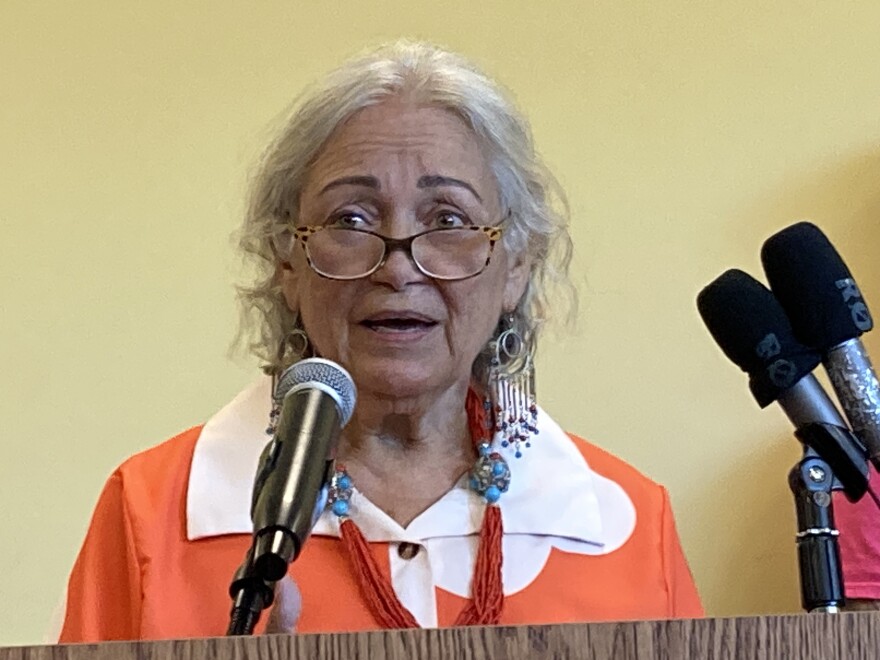Anna Maria Mendez lives in the Shenandoah Valley, between Harrisonburg and Luray. She takes care of her 94-year-old mother who has dementia. It’s a demanding job, but she’s been able to cope because Medicaid has paid for some in-home care and support services. Now, she’s worried. Even before new cuts to the program kick-in, her mom’s been removed from the rolls.
“We get a letter that says she no longer qualifies for Medicaid. I have no idea why.”
Three-hundred thousand people are expected to get similar notes from the state as a result of what Donald Trump called his big beautiful bill, and those who remain in the program will have to apply again every six months.
“They’re betting that if they make it hard enough, people will give up, and sometimes (believe me folks), that’s how I feel.”
She’s furious with the Republican candidate for governor, Winsome Earle-Sears.
“She was asked about these cuts. She said, ‘Don’t panic.’ Well guess what. We’re already panicking. We panic when we make a phone call and can’t talk to a human being. We panic when we have to choose between caregiving and paying our rent.”
Republican State Senator Chris Head says hospitals are also in a panic over what Medicaid cuts will mean for them.
“There is just a foreboding fear among the hospital administrators that I’ve come in contact with, because there’s so much we don’t know.”
For example, the new law requires Medicaid recipients to work, do community service or study at least eighty hours a month, but Virginia’s Director of Medicaid, Cheryl Roberts, says details are lacking.
“We do not have ‘what is a work, community service or education definition yet.”
The new law sets aside $100 million to help rural hospitals in the Commonwealth, but Senator David Suetterlein doesn’t know who will qualify for that money.
“Roanoke and Salem are urban. They both have major hospitals, and they both serve substantial rural populations. Are we likely to be deemed rural?”
And we don’t know how many people will be unable to afford insurance through Obamacare when the federal government stops providing tax credits to make premiums affordable. State Senator Creigh Deeds is begging members of Congress to restore those credits.
“We are going to lose more than 100,000 people from insurance if these tax credits are not extended.”
As people lose their insurance or Medicaid coverage, physicians like Andy Wolf, who volunteers at Charlottesville’s free clinic, expect a crush of new patients like the man he saw earlier this summer.
"A couple of weeks ago, a patient without health insurance walked over three miles in 90-degree heat, within a week of his discharge from the hospital for a heart attack and kidney failure. He had been discharged with prescriptions for a number of critical medications, but he couldn’t fill any of them, because he couldn’t afford to. We are already working at capacity, and we’ll be overwhelmed by the influx of uninsured patients kicked off of Medicaid.”
Dr. Gregory Gelburd, a family physician from Charlottesville, says people with a chronic illness – like diabetes, cardio-vascular disease or high blood pressure – will only get worse without treatment.
“If they cannot afford their medicines, their nutritional consults, their physical therapy, they will get sicker and sicker. And then once they get insurance – let’s say they turn 65 and at least get Medicare if it’s still around, they will have far more disease and far more expenses therefore.”
Some people are hoping Democrats will take control of Congress after elections in 2026, but state Senator Deeds isn’t counting on that.
“There are parts of the bill that don’t take effect until 2027 or 2028, but the reality is even if the Democrats retake the Congress in 2026 you have got to have a president who’s willing to sign a bill or have majorities large enough to override those vetoes, and that doesn’t look likely to me.”
He says there will be time to restore Medicaid and tax cuts later.
“But the reality is that people are going to suffer, and some may not survive.”
Ironically, many likely to lose coverage don’t know that federal payments to Medicaid will be cut. Again, Dr. Greg Gelburd.
“These people are so overwhelmed with their lives. They honestly rarely pay attention to the news. + They just don’t know, and so it will come as a complete surprise to many, and we do have posters in the office indicating about what’s happening, but, honestly, I don’t know how many people actually read them.”
Many will finally get treated in emergency rooms, putting an extra financial burden on hospitals, and some of them are likely to close. Gelburd says that will mean more economic woes for rural Virginia.
“When there is a hospital in a small town, a third of the people in that town work at that hospital, so if you lose a hospital you lose all those jobs. Then the stores go away as well, and the physicians leave.”
The bill will also mean drastic cuts to programs for people with HIV and AIDS, to Planned Parenthood and to drug addicts now in treatment. One expert predicts their numbers will rise and so will deaths due to opioid overdose.


